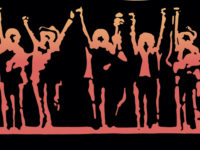We find Robbie Robertson, former guitarist with Bob Dylan and the Band, again hurtling through the Mississippi Delta, racing past old churches with scolding signs out front, hanging out with grifters and cardsharps, searching for something deeper, something real.
This time, it’s different, though. He’s older now, with friends and youthful dreams long gone. So many hopes lay in pieces all around. And, in sorting through them, Robertson sees things now, new things, that I don’t.
“What is lost? What is missing?” Robertson asks on “When The Night Was Young,” set for release in April as part of Robertson’s fifth solo album, How to Become a Clairvoyant on 429 Records. “We could change the world, stop the war. … But that was back when the night was young.”
Martin Pradler’s Wurlitzer piano work perfectly echoes the song’s strange sense of plaintive melancholy. Strange because Robertson’s best efforts with the Band were never about changing the world, to my ear, so much as pining for another one. They weren’t agitators, so much as celebrators of an America that had been briefly misplaced amid the late-1960s din of wartime atrocities, desultory protest and staggering assassinations. Yet, the Band — and this is where I think Robertson’s going awry here — didn’t take the easy way there. This was a music found in, and sung in commemoration of, wide open spaces, but with all of the joy and innate fears that they bring.
During a period of desperate, numbing displacement, Robertson and Co. made complex songs that felt simple, perfect for the times. The Band could sound exactly like the comforts of home, but they didn’t shy away from our moral dramas, either: Every family, and every country, has its quiet resentments, its secrets, its separations. So, the Band ran a dense emotional gamut: From the hauntingly serious (“Tears of Rage,” “Acadian Driftwood,” “King Harvest”) to the adventuresome and free (“Up on Cripple Creek,” “Rag Mama Rag,” “Life is a Carnival”).
When the night was in fact still young, the Band was by turns vibrating with excitement, and then trembling with fear after risking so much. Yet they were always so very much alive. Make no mistake, as they combined rock and folk with New Orleans jazz, Motown, black gospel and bluegrass, there were risks. Just not the ones that he’s talking about here. Instead, Robertson now toys with pathos, even obsolescence. I’ve never heard him sounding so defeated, and I still don’t know why.
Living with the ghosts of the period can’t be easy. Surviving members of boomer bands have had to recalibrate. After all, they’re long past the point of dying before they get old. But the world so many of them longed for — well, certainly, the one the Band and Robbie Robertson so fervently talked about — is still out there to be celebrated, to be explored.
Missing, it may be, but it’s certainly not lost.
- The Band’s ‘Christmas Must Be Tonight’ Remains an Unjustly Overlooked Holiday Classic - December 25, 2016
- Nick DeRiso’s Best of 2015 (Rock + Pop): Death Cab for Cutie, Joe Jackson, Toto + Others - January 18, 2016
- Nick DeRiso’s Best of 2015 (Blues, Jazz + R&B): Boz Scaggs, Gavin Harrison, Alabama Shakes - January 10, 2016





Thanks for the preview. I think one reason RR sounds blue is the lack of Levon drumming to accompany the song. No Band ballad ever sounded listless. Pompos, sometimes, overdramatic, yeah, but listless? Never.
On the plus side, isn't that thwe long-lost Maria McKee chiming in with vocals?
Similar sounding, for sure. But it's actually Angela McCluskey, a Scottish singer-songwriter and member of Wild Colonials folk-rock group.
As for Levon and the boys, I hear Robertson's new album is also slated to include his first song on the Band's breakup: “This Is Where I Get Off.”